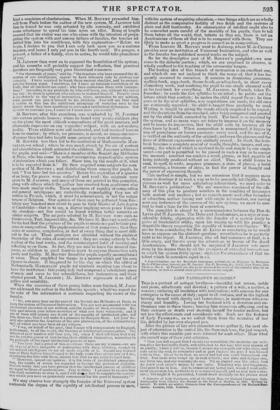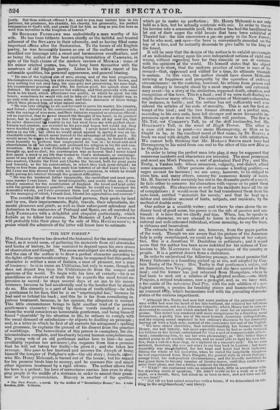LADY FANSHAWE'S MEMOIRS.*
THIS is a portrait of antique loveliness—beautiful but severe, noble and pious, affectionate and devoted ; a pattern of a wife, a mother, a woman; enduring all hardships with resignation ; with courage for any enterprise in the cause of duty; equal to all stations, and in the highest bearing herself with dignity and benevolence, in misfortune with con- stancy and humility. Loving her husband with a devotion and en- thusiasm rare in these times ; bearing him numerous offspring, and in their sickness or death ever showing herself the tender mother, but not less the affectionate and considerate wife. Such are the features of Lady FANSHAWE, as we collect them from the narrative of her life, detailed by her own eloquent pen. After the picture of her own character as we gather it, the next ob- ject of admiration is the united life, the thorough love, the just respect, with which this amiable pair were affected for each other. Hear what she herself says of their joint affection.
" Now you will expect that I should say something (the memoirs are writ- ten after her husband's death, and addressed to her son) that may remain of us jointly; which i will do, though it makes my eyes gush out wit!, tears, and cuts me to the soul, to remember and in part express the joys I was blessed with in him. Glory be to God, we never had but one mind throughout our lives. Our souls were wrapt up in each other's ; our aims and designs one, our loves one, and our resentments one. 'We so studied one the other, that we knew each other's minds by our looks. Whatever was real happiness, God gave it me in him. But to commend my better half, which I want suffi- cient expression for, methinks is to commend myself, and so may bear a cen- sure; but might it be permitted, I could dwell eternally on his praises most
* Memoirs of Lady Fanshawe, wife of the Right Hon. Sir Richard Fanshawe. Ambassador from Charles the Second to the Court of Madrid, in 1665. Written by herself. To which are added, Extracts from the Correspondence of Sir Richartkiliia4 shave. London, 1620. Colburn.
justly. But thus without offence I do ; and so you may imitate him in his patience, his prudence, his chastity, his charity, his generosity, his perfect resignation to God's will, and praise God for him as long as you live here as with him hereafter in the kingdom of heaven."
Sir RICHARD FANSHAWE was undoubtedly a man worthy of his wife. He has been hitherto known chiefly as the faithful and trusted adherent of the STUARTS in their adversity, and as having filled some important offices after the Restoration.. To the lovers of old English poetry, he was favourably known as one of the earliest writers who moulded our language into a sweet and harmonious versification, and as being the author of the best existing translation of CAMOENS, in spite of the high claims of the modern version of MICKLE : some of 1 his minor original poems, too, have long been favourites with the amateurs of old English poetry. Listen to his wife's report of his estimable qualities, his personal appearance, and general bearing.
" He was of the highest size of men, strong and of the best proportion,
1. his Complexion sanguine, his skin exceedingly fair, his hair dark brown, and ' very curling but not very long, his eyes grey. and penetrating, his nose high,
his countenance gracioys and ',file, his motion good, his speech clear and distinct. He never used exercise but walking, and that generally with some book in his hand, which oftentimes was poetry, in which he spent his idle hours; sometimes he would ride out to take air ; but his most delight was, to go only with me in a coach some miles, and there discourse of those things which then pleased him, of what nature soever. " He was very obligiqg to all, and forward to serve his master, his country, and friend ; cheerful in his conversation ; his discourse ever pleasant, mixed
[ with the sayings of wise imen, and their histories repeated as occasion offered ; [ yet so reserved, that he sever showed the thought of his heart, in its greatest i sense, but to myself ody : and this I thank God with all my soul for, that he never discovered h trouble to me but went from me with perfect cheer- fulness and content, nor revealed he his joys and hopes but would say they were doubled by purSing them in my breast. I never heard him hold dispu- tation in my life ; but often he would speak against it, saying it was an un- charitable custom, which never turned to the advantage of either party. He would never be driwn to the fashion of any party, saying, he found it suffi- cient honestly to 'perform that employment he was in : he loved and used cheerfulness in alb' his actions, and professed his religion in his life and con- versation. He was a true Protestant of the Church of England, so born, so brought up, and so died; his conversation was so honest that I never heard him speak a word in my life that tended to God's dishononr, or encourage- ment of any kind of debauchery or sin. He was ever much esteemed by his Itwo masters, Charles the First and Charles the Second, both for great parts and honesty, as for his conversation, in which they took great delight ; he being so free from passion, that made him beloved of all that knew him ; nor
did I ever see him moved but with his master's concerns, in which he would
I. hotly pursue.bis interest through the greatest difficulties. I " He was the tenderest father imaginable, the carefullest and most gene- ! rous master I ever knew. He loved hospitality, and would often say, it was wholly essential for the constitution of England. He loved and kept order with the greatest decency possible; and though he would say I managed his { domestics wholly, yet I ever governed them and myself by his commands ;
j in the managing of which, I thank God, I found his approbation and content."
The eventful life of these two excellent persons, their perils by land [ and by sea, their imprisonments, flight, travels, their relaxations, do- t mestic pleasures and griefs, as well as their subsequent splendour and distinction in the embassies of Portugal and Spain, are all narrated by 1 Lady FANSHAWE with a delightful and eloquent particularity, which I forbids us to follow her course. The Memoirs of Lady FANSHAWE I will probably take their place by the side of Mrs. Hurcluissox's; a Ipraise which the admirers of the latter will know how to estimate.



















 Previous page
Previous page